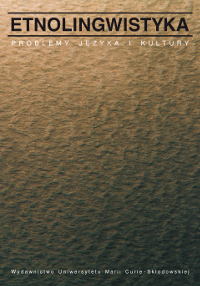Uwagi o mało znanych aspektach kategorii swój/obcy w ujęciu Józefa Obrębskiego
US / THEM in Józef Obrębski’s theory and fieldwork
Author(s): Anna EngelkingSubject(s): Anthropology, Language and Literature Studies, Applied Linguistics, Philology
Published by: Wydawnictwo Naukowe Uniwersytetu Marii Curie-Sklodowskiej
Keywords: us vs. them; Józef Obrębski; ethnic identity; self-stereotype; Polish-Rus’ relationships; Polesia; Jew; woman
Summary/Abstract: The article deals with unique ideas of Józef Obrębski, published in 1936 and relating to the theory of an ethnic group, a dialogic nature of national identity and the structure of the US / THEM opposition. The shaping of one’s image of a group is possible only through contact and dialogue with other groups, for only contact allows one to identify differences and develop the feeling of one’s own ethnic identity (self-stereotype). According to Obrębski, the US / THEM category has a mental and not an ethnographic nature; therefore, it is humanistic and imagistic. The image of one’s own group is a negative of that of others; it is composed not of all features but only of socially distinctive ones. The US / THEM opposition is also contextual, dependent on historical conditions, language, rituals, cultural patterns. A claim is made that Obręski, who referred to the work of Florian Znaniecki and Jan S. Bystroń, was also inspired by structural linguistics, specifically the conception of distinctiveness and the phonological theory of opposition, which distinguished a phoneme from a phone or the functional and mental aspect from the physical aspect.The article also presents the means in which Obrębski portrayed the US / THEM opposition in relation to: (a) Polish --- Russian relations in Polesia, where national contrasts are augmented by deep social differences of the type “master --- peasant” and additional characterological connotations; (b) the image of a Jew as a stranger to the Polesia community but at the same time a mediator between ethnic groups in the region; (c) the social and ritual foreignness of women, who from the point of view of the mentality of patriarchal families were an “internally foreign” element.
Journal: Etnolingwistyka. Problemy Języka I Kultury
- Issue Year: 19/2007
- Issue No: 19
- Page Range: 61-73
- Page Count: 13
- Language: Polish

